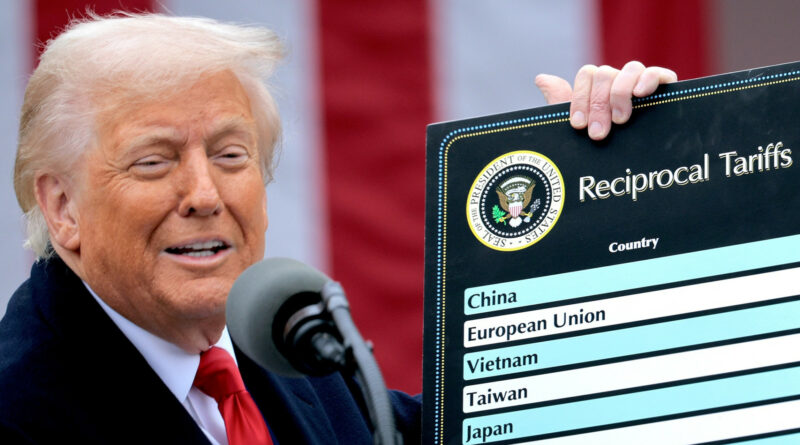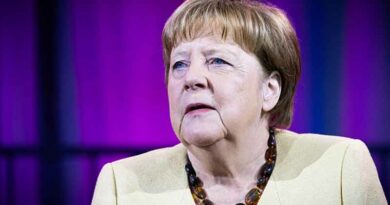Tariffs: Friend or Fiend? Part 1- Stanislav Krapivnik
Source : patreon.com – avril 2025 – Stanislav Krapivnik
https://www.patreon.com/posts/tariffs-friend-1-126129594
Abonnez-vous au canal Telegram Strategika pour ne rien rater de notre actualité
Pour nous soutenir commandez les livres Strategika : “Globalisme et dépopulation” , « La guerre des USA contre l’Europe » et « Société ouverte contre Eurasie »
With the mass tariffing of global trade–at least the percentage of it that passes through the US–imposed by President Donald Trump over the past week, the issues surrounding Tariffs as a policy tool are unavoidably front and center in public debate. It seems to us that people are being herded into two diametrically opposed camps: the traditional neo-liberal economists, who insist all tariffs are bad…and the MAGA, mostly economically illiterate crowd which says all tariffs are good, Trust the Orange Man Plan. I do not include in this accounting the majority of Democratic voters, EUrocrats and so forth, who are mostly just as economically illiterate as the regular Joes wearing MAGA hats, but like NPCs in a video game repeat whatever their owner classes tell them to say.
So if the NPCs political/financial masters who are opposed to Trump tell them tariffs bad, then they’re bad. The 28,000+ sanctions on Russia, which have cost the unwashed $380 billion and counting and numerous jobs and soon their pensions and possibly the lives of their sons and daughters in combat for Ukraine…all good. Eh, the curse of the low information voter and bureaucrat!
As for those who are educated but not equally blind adherents of neoliberal economics of open borders and absolute ‘free’ (in reality, Western banking cartel dominated) trade in a post national, post cultural, post humanity globalism, I will write for you this short dissertation. I will warn MAGA readers in advance that this is not yet another piece about how Trump is playing 5D chess against everyone, but neither will it blame the Orange Man for factors that have been spiraling downward for the USA well before he returned to office. A meme from Margin Call (2011), a favorite Wall Street film of ESW regular commentator Veles and the ESW Team
A meme from Margin Call (2011), a favorite Wall Street film of ESW regular commentator Veles and the ESW Team
We shall begin with how tariffs can and should be used effectively. I myself am a mercantilist by economic theory and yes, I have studied economics and global trade at university, where the neoliberals did their damndest to brainwash me. Yet Mercantilism has been the main economic theory driving trade for 400 years, or arguably going much further back, if you count the economics of the trading silk, ceramics and spices for gold and silver in the Tang Dynasty. But the more modern theory of the 1800s, State Capitalism, is what I place stock in. Quite simply because myself and my fellow Russians can observe every single economic success story over the past several decades, especially among the Asian Tigers of Singapore, South Korea and Japan through the 1980s Plaza Accords (with Trump trying to implement Mar a Lago Accords) crippling the Japanese export model all the way to the Grandest of All State Capitalisms, that of ‘Communist’ (aka neo-Confucianism with Red trappings) China.
Despite US trade concessions to its Asian allies and British colonial legacy privileges for Hong Kong and HSBC, to say that all of these examples were simply ‘free trade’ in action is laughable. Lee Kuan Yew, possibly one of the greatest statesmen of the 20th century and one of a handful who will be remembered 1,000 years from now, directed a state capitalist model which made Singapore an export powerhouse, and one that the Mainland Chinese under Deng Xiaoping swiftly adopted.
Singapore and the UAE Achieved Lasting Results Through An Enlightened President for Near-Life and a Monarchy, Respectively
As for my personal politics, I am a constitutional monarchist, where the monarch should be the head of the executive branch for life, eliminating the speculative bubble short-termism that plagues so-called democracies. LKY’s long reign in Singapore as Prime Minister from 1959 to 1990 and as a kind of PM Emeritus through 2001 is probably the closest approximation to an enlightened monarch of our time. The ruling clans of the United Arab Emirates have also achieved a great deal which would not have been possible via so-called democracy in the Gulf.
For most Americans, full indoctrinated in pseudo-republicanism turned democracy, this is an alien concept, even a kind of heretical talk for their civic religion. Didn’t the colonists revolt against the British Crown (only for their descendants to be re enslaved by a City of London centered financial oligarchy)? Why a monarchy?
1. A monarchy is built upon a key fundamental aspect: property ownership. Without this key, the full and right ownership of property, no free market internal system of commerce can be sustained. Democracy not only does not sustain this, it’s observably led to tyranny and or collapse since the ancient Greeks (see the fall of the Athenian Empire and later, the Roman Republic), driving in the modern world towards full socialism and confiscation of property from one oligarchic clan to another, as the inevitable rise of demagogues drive the ever poorer and desperate masses against one perceived enemy after another.
Monarchy is a guarantee of property ownership, indeed hereditary families must view the nation as their inheritance rather than just biomass to be manipulated. Thus the ability to plan forward and work towards more distant economic goals both on a national macro and a household micro level. It is not for nothing that the destruction of Europe’s most powerful monarchical empires of the Turks, Romanovs, Hapsburgs and Hohenzollerns required the first total war from 1914 to 1918, and led to genocide of Armenians, Russians (in the Civil War then WW2), and then of the Poles and European Jewry–all within a few short years.
“Democracy is indispensable, not because it renders superfluous the conquest of political power by the proletariat, but, on the contrary, because it makes this seizure of power both necessary and possible.” Rosa Luxembourg (A German-Jewish Marxist philosopher)
2. Monarchy creates stability, both social and economic. Monarchy removes the divisive constant elections cycles-fueled jostling for the top position, as well as the rush towards patronage degenerating into outright looting of the treasury (if we don’t steal while we are in office, then the other side’s guys will do it anyway). This is the absolute corruption that almost instantly assures that the system is broken almost from day one.
Of course the Republican-Democratic duality in the U.S. appeared stable enough, but because of the gradual degradation of the electorate since 1963, even this is not in any way guaranteed. However, quickly enough, human nature, total corruption, a quest for power in any form, takes over. Special interests and foreign agent manipulators, and they are always there in the shadows, will always leave their marks. They certainly have in the United States, where the Lobby for a small militant country in the Southeastern Mediterranean as well as the broader Anglo-Globalist ‘Atlanticism’, the latter with a fierce drive to dismantle Russia, have predominated in Washington.
“A republic, if you can keep it.”
The answer Benjamin Franklin’s gave to Elizabeth Willing Powel on her question about what type of government was agreed upon for the United States: « Well, Doctor, what have we got, a republic or a monarchy? »
Additionally, from an economic standpoint, the stability that a monarchy by its very nature lends, is critical. Lets look at things realistically, any major economic project or shift in an economy requires long-term investment and training multiple generations of managers, passing the baton from the elders to the younger. You do not build a Three Gorges Dam in 2 or 3 years, it just does not happen, the Chinese began planning Three Gorges even while they lacked the resources to build it, in the 1950s. However, constant elections means all top politicians think short term, toward the next elections. They need to show something short-term for the public, even if that perceived short term gain is in detriment to the medium and long term perspectives of the nation as a whole. This is a major reason the US has been degenerating morally and in economic terms, and the once great American middle class has been in decline for decades.
Additionally, be it as it is, a President always rules a divided nation, and he will of course be out to reward those provinces or states that voted for him, and not those who voted for his opponents. We saw this process intensify with Obama’s ‘shovel ready’ fake infrastructure projects that amounted to billions spent on non-existent high-speed rail in states like California. This all leads to a very lopsided short term investment policy and gross distortions in the development of an economy. Businesses that rely on that mirage of new infrastructure creation tend to not survive or migrate at first to better areas of the nation, and then just export manufacturing abroad.
“Bourgeois class domination is undoubtedly an historical necessity, but, so too, the rising of the working class against it. Capital is an historical necessity, but, so too, its grave digger, the socialist proletariat.” Rosa Luxembourg
So now you know why I am a monarchist, as for the constitutional part, because the people still need their voice and there needs to be a strict frame work to work within, so that you do not get constant power plays and pulls like say in the British state, where the King and Parliament were in constant power struggles from the Magna Carta through the War of the Roses and English Civil War, and even to this day (see what happened to the royal succession between princes William and Harry, for example, with Charles III hanging on to the title even though he likely should’ve been passed over in favor of a more worthy heir).
Now that you understand from whence I come from and for some, this may unlock a plethora of previously taboo or verboten ideas; we can discuss the mercantilist and its offspring the state capitalist aspect. All of this is of course building up to the Tariff question, which we will cover in part two of this series, a bit later. For those whom are impatient, you can of course jump forward to part 2 here on the ESW Patreon and at ExitStrategyWorld.com, but without the needed foundations, one cannot evaluate new information properly. This is the bane of modern Western education; it glosses over or presents only straw men versions of competing theories, pushes only one ‘end of history’ narrative and even in this case, tends not to go to deep, so that uncomfortable questions don’t arise.
And yet…parts of the Pentagon recognizing that finance, insurance and real estate (FIRE) dominated economies can’t and won’t produce enough shells to fight a true peer level war has forced a limited reckoning under Trump. Yet Washington and especially its jilted Eurovassals have a long way to go toward changing the fundamentals which led to this sorry deindustrialized situation, principally the Dutch disease of printing dollars rather than producing manufactured goods the world actually wants at affordable prices.
Mercantilism
What is mercantilism, it short it is an economic system that encompasses and guides both internal and external development and rests on 3 key pillars:
1. Maximum utilization of the nation’s resources. This goes both for natural and human resources. Therefore, in the short of it, the nation should manufacture everything it can for its own use. So much for The Wealth of Nations, an anti-industrialization propaganda piece for the world, from the main industrialized power of the time, the British. Who rightly feared that their American colonies might one day become stronger and more populous than they, as Benjamin Franklin projected into the then distant late 19th or early 20th century. Most do not realize this because they lack the historic context to put this most famous of propaganda works in their contemporary context, rather than treating Adam Smith’s treatise as timeless scripture.
This concept can and will be problematic for small nations, but those can ban together into trade blocs to try and alleviate these issues. One such example is Mercosur, which has proven less bureaucratic and centralized than the attempted European Superstate. But Russia is a big nation, the biggest by land and resources in the world, so pardon, but it is what it is as the core of the Eurasian Economic Union (EAEU). The US is no slouch in this sector either with NAFTA.
2. Sell finished goods, buy, only if you absolutely must, raw resources. This goes for external trade. Selling oil costs $50 to $80 on the barrel, selling the same 55 gallon or 220 liter drum of gasoline will net you around $200. The interesting thing is, the operational costs of getting the oil out and transporting it to the customer are liter per liter more than the additional cost of processing that oil into gasoline. Additionally, moving up the value chain also creates lots of jobs and additional industries, such as a petrochemical industry, pipe manufacturers and the service industries serving the additional infrastructure with well-paid employees.
The nation must move up the value chain as far as possible, a pyramidal structure that build lots of infrastructure and wealth below that pinnacle of finished goods. This is yet another reason why the ‘Russian economy is smaller than Italy’s’ is laughable nonsense. While Italy does contribute to Airbus and has some military aerospace firms as well, how many completed nuclear reactors are the Italians exporting? How many nuclear powered warships and icebreakers are being built in Italians shipyards?
3. If you sell abroad…only sell for things that hold intrinsic value. As an example, sell the finished furniture in exchange for the raw wood. Or, if for currency then for currency that is backed by real value, not the fiat ethereal currency be they paper or easily manipulated cryptocurrencies. That means, sell for hard currency or Bitcoin that can ultimately be converted into gold, silver, platinum, diamonds and so forth.

Now, to guide that internal development, we turn to the State Capitalism. Which dismisses the silly and absolutely absurd notion of the invisible hand of the market, this neutral and all good force that moves those who are the best forward and punishes the lazy, or some such fake economic karma for the ignorant masses. The reality is, this is as absurd as the idea that any boy from any American family can grow up to be president.
The reality is that special interests will always skew the effects of the market that is their job, their reason for being.
The idea behind State Capitalism is that the government with the key business leaders decide on the direction they want the economy to grow in the next 5, 10, 20 years and take the needed actions to make broad goals achievable. They do this through growing specific industries, protecting them from foreign competition. They then develop human capital in the directions needed, helping to train enough engineers. They also forge tax policy and direct investment as needed.
That’s correct, under State Capitalism, the State part does not wait for some businessman or corporation to finally figure out that such and such manufacturing is needed and then get around to building it. The State moves forward, builds that plant and then partially or fully divests of it, letting it be run by private actors who can convert to peacetime technologies (like food delivery as opposed to battlefield robots) once the war is over. The key here is that the needed niche is filled.
Why is the Russian military sector performing so well against all of NATO, to the point that the leading British think tank the Royal United Services Institute (RUSI) had to admit it? It’s because Russia practices a form of State Capitalism, with the government much more involved than in regular state capitalism. The issue here is product and niche first, profit later and the profit by all means will come, as the weapons developed and tested on the battle field of the Special Military Operation will then be sold to foreign customers like India or Algeria. Whereas NATO does the opposite, it builds arms that might as well be gold-plated for the show room, not for war, and always seeks maximum profiteering up front.
After all, Ukraine might suddenly implode or capitulate to Russia’s terms, so the incentive for Western arms dealers is to pad the price even of barely refurbished Cold War-legacy rust buckets (like thousands of the old M113s) in the here and now. Most definitely NOT to invest in shell production for the long term, hence the little hermit kingdom North Korea outproducing the whole of European NATO in artillery and rocket rounds.
Part 2: How tariffs should be used and what economic reset will follow the Trump tariff wars, which have merely accelerated and made unavoidable certain existing trends.




